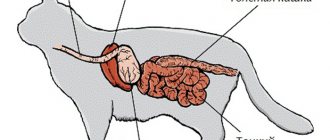Causes
There are a huge number of reasons that provoke such a painful condition. Disturbances in the functioning of the body can occur both due to poor nutrition and genetic abnormalities. However, the most common reasons can still be identified:
- hormonal disorders or hormonal changes;
- poor living conditions;
- poor nutrition;
- failure of the endocrine system;
- decreased immunity
- presence of chronic diseases;
- parasites of internal organs.
Vomiting also occurs against the background of the death of offspring. Injuries, bruises, harmful substances, poisons and much more have an extremely negative impact on intrauterine development. If the kittens die, a miscarriage occurs.
Genetic abnormalities often cause toxicosis in cats during pregnancy. Siamese, Abyssinian, Bombay breeds are susceptible to it, and a similar condition is also observed in Devon Rex and their mixed breeds.
What to do?
Help your cat survive 10 days of discomfort, perhaps by following simple rules:
- Ensure complete rest. During sleep, immune defenses are restored. Restful sleep reduces the risk of contracting diseases during such a difficult period.
- Comfortable conditions. The animal may be nervous, it is important to support the pet, calm it down and pay attention to it.
- Nutrition. There is no need to force people to eat; it is better to offer several types of foods to choose from. It is better to reduce the portion size and increase the number of meals. Water or milk should be available at all times.
It is important to understand that the use of medications for pregnant women is prohibited. If the development of toxicosis occurs against the background of chronic pathology, treatment should only be prescribed by a specialist. You should not resort to self-medication; such a thoughtless approach can only provoke a complication that will negatively affect the cat’s health, but also cause pathological abnormalities in the intrauterine development of the fetus.
Signs
Pregnancy in domestic cats lasts 9 weeks, which are usually divided into trimesters. Most often, the painful condition manifests itself in the first trimester, after 3-4 weeks. It is one of the first signs of pregnancy in a cat and lasts up to 10 days. Cases of vomiting in late stages are extremely rare.
The most striking symptom of toxicosis is nausea. It occurs in the morning, after eating. The pet becomes lethargic, its mood is close to depressive: apathetic, drowsy. Aggressive behavior is also possible. She may, on the contrary, become more affectionate: often demand attention and communication.
The expectant mother's taste preferences change. She refuses food or treats that she readily ate before pregnancy. Disorders of the digestive system are possible, which ultimately leads to diarrhea.
Course of pregnancy
During the entire period of gestation, the animal must be under the constant supervision of a doctor and owner.
The usual physiological process of development of a fertilized egg in a cat’s body lasts from 55 to 63 days. This period is influenced by the breed of the animal and the number of kittens that should be born. Only a pregnancy with a large number of fetuses can reduce the gestation time. The picture of the development of the special state of the animal is as follows:
If the mating is successful, then the first few weeks for the animal become more drowsy.
- In the first 3 weeks, behavior changes: the cat sleeps a lot of time, eats more and moves less. Closer to 21 days, the nipples swell and become pink.
- During 4-6 weeks, characteristic features of pregnancy appear. The belly gradually becomes rounder, and after 40 days it begins to grow rapidly. During this period, the veterinarian can feel the number of embryos.
- At 7-9 weeks, the cat's appetite decreases, but she still sleeps a lot. If you put your hand on your stomach you can feel the babies moving. The closer the 63rd day, the lower the stomach drops (located in the hip area). The animal does not leave its owner, but at the same time is looking for a place to build a nest for its offspring.
Visible symptoms
The fact that a cat is pregnant can be assumed by changes in its character and behavior; only a veterinarian can make an accurate diagnosis. There are no obvious symptoms to be noticed immediately after mating; the first characteristic signs that will indicate the imminent appearance of kittens will appear after fertilization only after 3 weeks. The following visible, distinctive signs are distinguished:
A manifestation of this condition in an animal is an enlargement of the mammary glands.
- enlarged mammary glands;
- low physical activity;
- lethargy and drowsiness;
- lack or increase in appetite;
- change in taste preferences.
Should I worry?
If toxicosis is mild, then there is no need to focus on it. Nausea is short-term and will disappear on its own in a few days. But if attacks of vomiting are accompanied by unnatural symptoms, then this is already a cause for concern.
Dehydration indicates that your pet has poisoning or kidney failure. Impaired kidney function makes it difficult to eliminate harmful substances, which means that some of the toxins will be absorbed by the offspring. The main signs of dehydration are a dry mouth and a dull, dull coat.
Low temperature readings can indicate not only intoxication of the body. Sometimes this signals that the pregnancy is fading.
Diarrhea can also occur due to poisoning. However, stool disorders are observed with intestinal infections, colds, and damage to the tissues of the digestive organs. Diarrhea is dangerous because it can cause miscarriage.
Other signs that indicate problems include:
- vomiting too often;
- complete refusal of food and water;
- dyspnea;
- heart rhythm is disturbed;
- muscle pain.
Symptoms of feline toxicosis
Normally, the symptoms of toxicosis in cats are mild:
- poor appearance, unkempt, tousled coat;
- lethargy, apathy;
- periodic refusal to eat;
- vomiting, possibly with bile.
Be careful: if other manifestations of indigestion appear, then toxicosis has nothing to do with it. To avoid controversial situations, after mating, you should not change the cat's food or give the cat unusual foods that can cause upset.
It is also possible that your cat picked up a dangerous virus along with pregnancy. If you experience diarrhea, vomiting, or urine colored in an unusual color, you should consult a doctor. Diarrhea is dangerous because it can cause miscarriage. And since most medications cannot be given to a pregnant cat, the decision to prescribe treatment should be made by a professional.
If the doctor does not determine any disease, and the cat's illness is toxicosis, it is the owner's responsibility to care for the cat and try to alleviate its condition. Catozal injections can be used as a maintenance drug, but only if the injection does not cause stress for the cat. As a rule, a balanced diet and your tenderness are necessary conditions for the cat to endure the period of toxicosis normally.
Toxicosis is a normal physiological state, a natural process. Symptoms come and go spontaneously. Man cannot influence this phenomenon in any way. Therefore, you should not worry too much if your pregnant cat is vomiting. Toxicosis appears as a result of serious hormonal changes that occur in a cat’s body during pregnancy.
There are many reasons that provoke the occurrence of toxicosis in pregnant cats. Some can be eliminated in advance so as not to provoke it.
When danger threatens
It is important! The pet must be urgently shown to the veterinarian if she has toxicosis in the later stages or before giving birth. This indicates pathology. There is a risk of death not only of the offspring, but also of the expectant mother.
As a rule, a cat with late stages of intoxication is immediately detoxified. Waiting for test results is very dangerous, since hours and even minutes are counted. The further course of treatment directly depends on the condition of the expectant mother and her offspring. If the kittens are full term, a caesarean section is performed. In other aspects, veterinarians try to support the patient until the moment of birth.
How to help a pregnant cat
A responsible owner should know how to help a cat with toxicosis. You need to try and create very good conditions for the cat expecting offspring to bear kittens. First of all, this is a properly balanced diet, which should contain complete vitamins. You can supplement your diet with special healthy supplements, both in the form of some natural products and vitamin complexes.
We invite you to read: Eye diseases in hamsters: what to do if a hamster’s eye does not open, is festering, inflamed or reddened
Under no circumstances should you try to force feed a cat during toxicosis if it suddenly refuses regular food.
You just need to offer her other foods and treat her with treats. The body may need to change its usual diet, so the pet has developed whims and tastes have changed. It is possible that there is too much food, and the cat refuses to eat only for this reason. You can slightly reduce the usual portion and observe your changing eating habits.
A pregnant cat needs constant monitoring. Her body adapts to bearing offspring and becomes more vulnerable. If your beloved pet has attacks of nausea in the early stages, then she can and should be helped.
Water should always be available. The same goes for food, even if the kitty refuses it. In this case, it is allowed to reduce the portions, up to a teaspoon. But at the same time, it is advisable to diversify the diet so that the pet can choose its own food. You can't force feed her.
The owner must provide the expectant mother with complete peace and comfort. She may be stressed or nervous. You shouldn’t ignore your worries, it’s better to calm them down. After all, stress weakens the immune system, making it even more vulnerable to diseases.
During pregnancy, a cat needs to sleep a lot. Only in sleep does the immune system work in full force and protect the body from bacteria and viruses. In addition, sleep helps you calm down.
Often, owners of furry female pets are interested in whether cats have toxicosis. And although experts believe that such conditions are unusual for them, some individuals experience attacks of nausea.
Toxicosis in cats indicates hormonal changes in the body. It can occur for any reason. However, in most cases it is not dangerous and does not require medical intervention. But some symptoms, combined with severe and frequent vomiting, indicate pathologies or poisoning.
Is toxicosis dangerous?
A mild, calm illness develops slowly and also gradually passes, does not harm the pet or kittens, and has no effect on vital organs.
You need to worry if, along with vomiting, signs unusual for toxicosis are observed:
- A sharp drop in temperature – possible poisoning, falling into suspended animation. In the early stages, pregnancy may “fade”.
- Diarrhea - poisoning, intestinal virus or cold, damage to the internal lining of the digestive system. May cause pregnancy failure (miscarriage).
- Dehydration – poisoning, kidney failure. Weak kidneys may not be able to eliminate toxins, which will worsen intoxication. The first “blow” from excess toxins during dehydration is “taken” by kittens. Signs of dehydration are dull fur, dry, inelastic skin, and a dry mouth.
A cat's pregnancy should take place under the close supervision of the owner. It is important not to resort to drug treatment without consulting a veterinarian. Even “harmless” drugs may be contraindicated for a pregnant animal. The expectant mother should absolutely not be given human antiviral drugs, antibiotics and herbal infusions without prescription, or alcohol tinctures.
Is there toxicosis?
Cat pregnancy is very similar to human pregnancy in miniature. Instead of 9 months, a cat's pregnancy lasts about 9 weeks, it is also customary to divide it into trimesters, and, like in women, toxicosis may appear in the cat in the early stages. In cats, symptoms of toxicosis may manifest as morning sickness.
Typically, symptoms of toxicosis in cats appear at 2-4 weeks of pregnancy and last about 10 days, but deviations from these dates are possible. Many breeders say that cats do not develop toxicosis at all, but in rare cases, a pet may suffer from regular morning vomiting for a month. Taking hormonal contraceptives shortly before pregnancy increases the likelihood of symptoms of toxicosis in your cat.
Toxicosis in cats is a natural symptom of pregnancy. The body experiences powerful hormonal changes, the uterus stretches, in general, everything is like in humans. But toxicosis is not dangerous for the cat herself and her kittens. If your pet's condition is very bad and scares you, consult a veterinarian by phone and call a doctor at home. The doctor will tell you how to relieve symptoms and cope with toxicosis in a cat.
With the onset of pregnancy, significant changes occur in the animal’s body, so at the initial stage, pregnant cats may develop a pathological condition that is accompanied by nausea. The unpleasant sensations last for 10-14 days and disappear by the end of 3-4 weeks.
We invite you to read: Control of offspring in the capital they opened a free veterinary station for sterilization of animals
Main reasons
Worm infestation in an animal can enhance the manifestations of this condition.
- parasitic worms (worms);
- presence of chronic infection;
- disruption of the endocrine system;
- decreased body resistance;
- hormonal disbalance;
- genetic features.
Despite the fairly large list of possible causes for the development of a pathological condition in a pregnant cat, toxicosis during pregnancy is a rather rare phenomenon and short-lived. When a cat is vomiting, there is no need to resort to special treatment, but if the pet’s health is alarming and causes concern, you need to seek help from a veterinarian.











